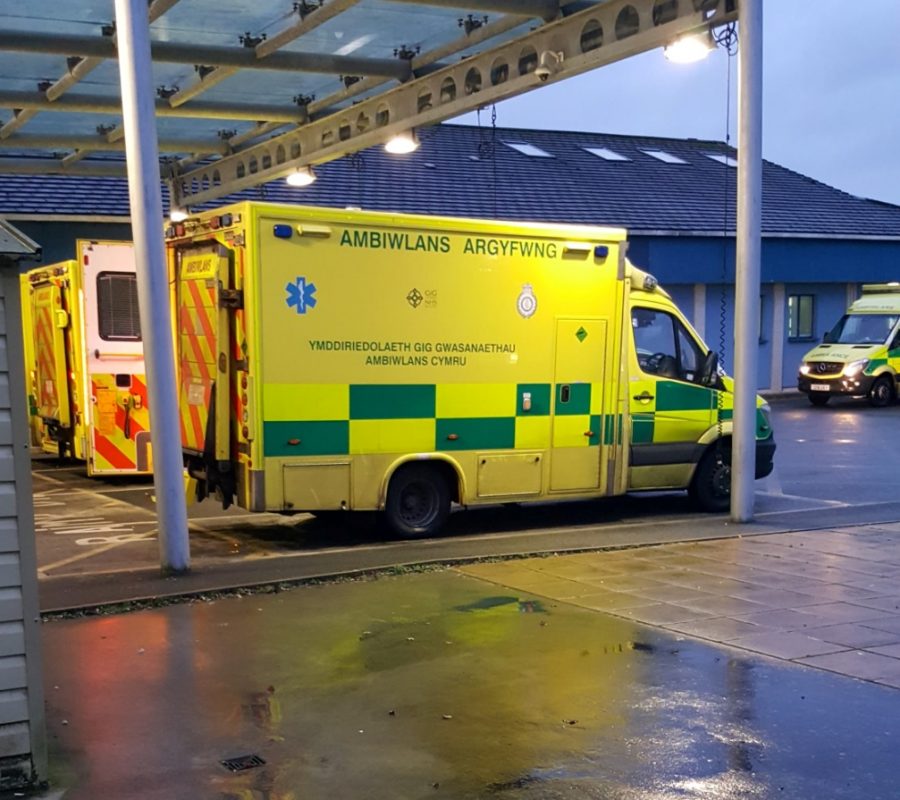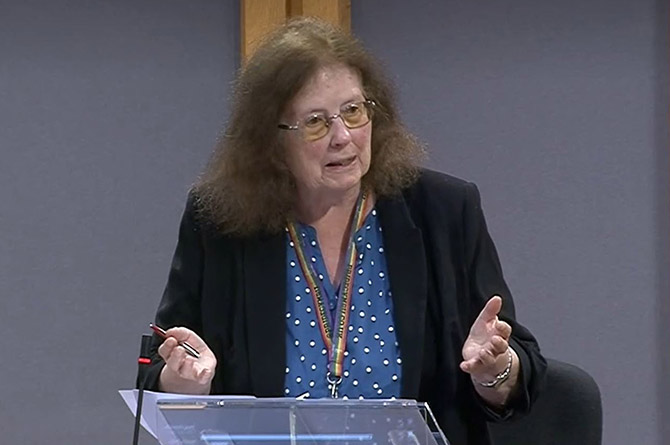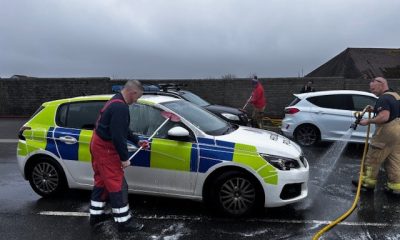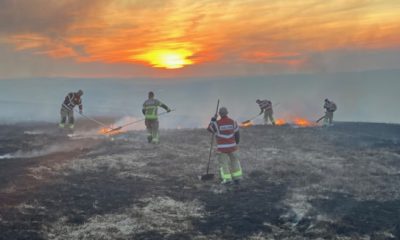Health
NHS facing unprecedented winter pressures amid record demand

THE NHS in Wales has been facing significant challenges this winter, with an exceptionally high number of emergency calls and delays that have put immense pressure on its staff and resources, according to the latest activity and performance statistics.
In January, the ambulance service received 5,009 red (life-threatening) calls, accounting for 13.9% of all calls. Despite a slight decrease from December, with an average of 162 life-threatening calls per day, this figure remains the third highest on record. The response times for these urgent calls have also been under scrutiny, with 48.8% of red calls receiving an emergency response within eight minutes, marking the second highest achievement for this metric. The average response time for these calls was 8 minutes and 11 seconds.
The performance data also revealed that approximately 27,000 hours were lost due to handover delays at hospitals, highlighting the systemic pressures faced by the health service. Despite these challenges, nearly all health boards came close to meeting the target for 97% of patient pathways waiting less than two years by 2024, missing it by a mere 0.03%.
Nesta Lloyd-Jones, Assistant Director of the Welsh NHS Confederation, commented on the impact of the winter pressures and the exceptional demand on NHS services. “The monumental efforts of our staff have led to some improvements, such as a decrease in the number of people waiting the longest for treatment in December. However, the progress is threatened by the junior doctor strike action in January and February, which has led to a significant number of planned care procedures being postponed.”
Lloyd-Jones stressed the need for comprehensive planning and significant investment in NHS infrastructure and social care to ensure the health service can continue to improve and meet the demands placed upon it. “Good planning alone is not enough. Without significant capital investment and a whole-nation approach to health and wellbeing, alongside substantial changes to social care funding and provision, the progress of NHS leaders will be limited.”
The Welsh NHS Confederation, which represents the seven local health boards, three NHS trusts, and other health organisations in Wales, has been vocal about the challenges faced by the NHS and the need for strategic investment and support to navigate through these difficult times.
Health
Hywel Dda appoints new of Executive Director of Nursing Quality and Patient Experience

HYWEL DDA University Health Board has today announced the appointment of Sharon Daniel as its new Executive Director of Nursing, Quality and Patient Care.
Sharon has held the role of Director of Nursing, Quality and Patient Experience at the health board on an interim basis since January 2024, pending the appointment of a substantive Chief Executive Officer.
A well-known and well-respected leader within the organisation, Sharon brings a wealth of experience to the role, having dedicated her entire professional career to healthcare in the Hywel Dda region. Her journey spans clinical, academic and managerial roles — from her early days as an adult nurse to positions in site management, lecturing, infection prevention and control, clinical governance, and general management.
Since 2015, Sharon has served as Assistant Director of Nursing, working across areas including infection prevention and control, professional standards and regulation. She stepped into the role of Deputy Director of Nursing in May 2023 and was appointed interim Director of Nursing in early 2024. Her appointment to the permanent position recognises her leadership and deep commitment to the local population and workforce.
Professor Phil Kloer, Hywel Dda University Health Board Chief Executive, commented:
“Sharon has demonstrated outstanding commitment and leadership throughout her career with Hywel Dda. Her passion for nursing, deep knowledge of our services, and genuine connection to the people we serve make her an exceptional choice for this role. I am delighted to announce her appointment, following a competitive and open process, and look forward to continuing to work alongside her as we drive forward our ambitions for high-quality, compassionate care.”
Speaking on her appointment, Sharon said: “Hywel Dda is home to me. My family and I are part of the population, and I have worked within healthcare here since I finished my formal training.
“I’m incredibly proud to lead such a dedicated and passionate nursing workforce and I’m excited to work with colleagues to celebrate our achievements and build on them as we look to the future. Together, we’ll explore opportunities for interprofessional team working to help deliver our clinical strategy and the very best care for our communities.”
Sharon’s appointment marks a significant step forward in the Health Board’s ongoing commitment to strengthening professional leadership and improving outcomes for patients and communities across Carmarthenshire, Ceredigion, Pembrokeshire.
Swyddfa’r Cyfryngau | Media Office
Cyfathrebu | Communications
Bwrdd Iechyd Prifysgol Hywel Dda | Hywel Dda University Health Board
mediaoffice.hyweldda@wales.nhs.uk
Health
Senedd criticises ‘unacceptable’ delays on infected blood compensation

SENEDD Members urged the UK Government to speed up compensation payments to people infected and affected by the contaminated blood scandal.
Labour’s Julie Morgan, who has campaigned on the issue for three decades, pointed out that nearly a year has passed since Sir Brian Langstaff published his damning final inquiry report.
More than 30,000 people in the UK were infected with HIV and hepatitis C after receiving contaminated blood products in the 1970s and 1980s.
Ms Morgan welcomed £11.8bn set aside by the UK Government but warned of “completely unacceptable” delays in issuing compensation to victims.
She told the Senedd: “But I can’t support the way in which the setting up of the compensation framework, and the Infected Blood Compensation Authority, has caused significant delays, and the delays in registering for the affected.”
Ms Morgan said two people die every week while awaiting compensation and 25 infected or affected people known to Haemophilia Wales have died since the inquiry began.
The former minister warned: “I’ve been told that the compensation tariffs are so complex that it’s extremely difficult to gauge who will be eligible. However, Haemophilia Wales estimates that there’ll be around 300 infected and affected entitled to compensation in Wales.”
She added: “I’ve also heard there have been rejections of transfusion estate applications due to the destruction of medical records held at the University Hospital of Wales.”
Stressing the practical impact of delays, she explained that if an affected person, such as a widow, dies the claim to compensation dies with them unlike with an infected person.
Ms Morgan said those infected and affected, some of whom gathered on the Senedd’s steps before the debate, have been fighting for justice for 40 years.
During topical questions on April 2, she told the debating chamber: “I think it’s up to us in this Senedd to do all we possibly can to urge the UK Government, and say, ‘Look, just get on with it, it’s just been far too long.’ This has been going on for years and years.”
James Evans, the Conservatives’ shadow health secretary, added his voice to a chorus of calls to increase the pace of compensation payments.
As did his Plaid Cymru counterpart Mabon ap Gwynfor who said: “Some patients’ families who have been in contact with me believe that the matter is being dragged out and that it’s intentional on the part of the government … to avoid paying out the compensation.”
Labour’s Hefin David, who represents Caerphilly, similarly raised the case of a constituent, echoing concerns the compensation scheme may unfairly discriminate against spouses and partners.
Rhun ap Iorwerth, who chairs the Senedd cross-party group on haemophilia and infected blood, urged Welsh ministers to press the case for compensation.
The Plaid Cymru leader quoted a constituent: “The government line is to meet its legal responsibilities as slowly as possible, in the hope we will all die soon and stop bothering them. We feel we are again being bullied by those in power, adding insult to severe injury.
“The situation cannot go on. The 4,000 or so infected victims must be compensated immediately so they can put the past behind them and enjoy the time they have left.”
Jeremy Miles, who was appointed Wales’ health secretary in September, said officials continue to press the UK Government on the need for timely compensation payments.

Mr Miles explained that the Infected Blood Compensation Authority is recruiting hundreds of claim managers who will prioritise claims for those nearing the end of their life.
Urged to make people’s frustration and anger known, he said: “The strength of feeling in the chamber is clear … it’s important to have a set of arrangements that can command confidence, so I’d be very happy to put the points to the UK Government in those terms.”
Health
Welsh public want NHS, cost of living and infrastructure prioritised

Report highlights top concerns and calls for long-term vision
THE WELSH public want the government to prioritise improvements to the NHS, tackle the cost of living, and invest in infrastructure, according to Deloitte’s latest State of the State report.
The 2025 report, published in partnership with the independent think tank Reform, reflects the views of both public sector leaders and the people who use public services.
For the third consecutive year, the state of the NHS and the cost of living were the most pressing concerns for people in Wales, with both issues cited by 75% of those surveyed. Social care for the elderly and vulnerable adults followed, mentioned by 48%.
Jobs and the economy (47%) and affordable housing (43%) were also high on the public’s list of priorities. One of the most notable increases was in concern about infrastructure—roads, railways and broadband—with 42% calling for improvements, a rise of six percentage points on last year.
When asked about the biggest drivers of future growth, respondents in Wales chose improving the nation’s health (45%), boosting education and skills (44%), and increased investment in infrastructure (39%).
Despite these priorities, most people were pessimistic about the outlook. Some 75% expected the NHS to stay the same or get worse, while 74% said the same about infrastructure.
Council chief executives interviewed for the report stressed that government infrastructure spending would be key to future growth. Other public sector leaders highlighted progress in Welsh transport, crediting a clear vision and strong partnership working for recent successes.
The biggest challenge facing public services, according to respondents, was a lack of funding, with 66% citing it as a concern. A further 55% expressed fears about a loss of trust in public services.
While trust in the Welsh Government remains higher than in the UK, Scottish or Northern Irish governments, the public remain sceptical about delivery. Some 63% said they had low trust in its ability to deliver major projects on time and on budget, while 61% doubted it could deliver outcomes people want.
On the question of taxation, Welsh public opinion was divided. Some 31% supported higher taxes and public spending, while 37% preferred lower taxes and reduced spending. Nearly half (47%) said they expected higher taxes and spending regardless of their preference.
Deloitte’s interviews with senior public sector leaders revealed ambitious long-term goals, including frictionless digital interaction with government services, improved collaboration between agencies, place-based planning for integrated transport and healthcare, and a shift toward long-term, commercially aware decision-making.
Dave Tansley, Deloitte’s senior partner for the South West and Wales, said: “The State of the State 2025 report shows the Welsh public remain concerned about the cost of living and the NHS. But our survey also found heightened interest in infrastructure, more so than in other parts of the UK, suggesting the public recognises the importance of connectivity to economic growth.”
He added: “Infrastructure investment supports jobs, housing, roads and rail—but more importantly, it provides the platform for long-term economic resilience. With public finances under pressure and the 2026 Senedd election approaching, the next administration faces difficult choices and the chance to deliver transformational change.”
Ian Howse, Deloitte’s senior partner for Wales, said: “Public sector leaders want bold reform—services that are joined-up, citizen-focused and tech-driven. While the Welsh Government is addressing immediate pressures, our research points to the need for a long-term vision. Leaders report growing urgency to deliver ahead of the next election, especially on economic growth, which is a positive sign for the future.”
-

 Charity7 days ago
Charity7 days agoEmergency services unite for charity at Pembroke Dock Fire Station
-

 Sport7 days ago
Sport7 days agoKildunne hat-trick rips Wales apart in record-breaking Six Nations clash
-

 Community7 days ago
Community7 days agoTenby comes alive with eccentricity as Steampunk Festival returns in style
-

 Education7 days ago
Education7 days agoSupported employment learners take off on airport adventure
-

 Community7 days ago
Community7 days agoFuneral arrangements confirmed for popular local entertainer, Matt Baker
-

 Business4 days ago
Business4 days agoSpaceX eyes Milford Haven for new UK facility
-

 Crime5 days ago
Crime5 days agoPembrokeshire farm worker accused of threatening to burn employer’s farm
-

 Crime5 days ago
Crime5 days ago‘Yeah but no but’ insult to female officer lands Monkton man with court fine






























